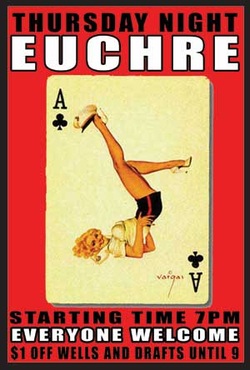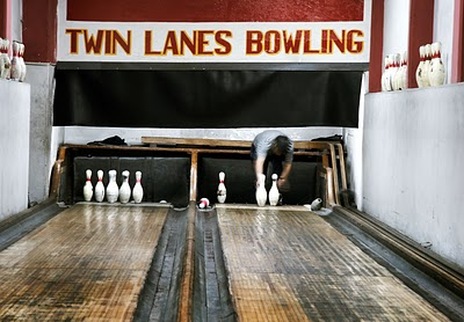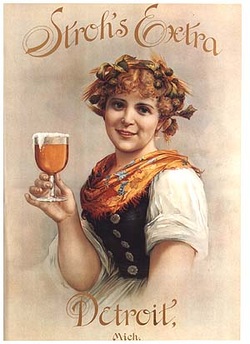People in the Midwest drink differently than everywhere else I’ve ever been; its far less recreational. You have to stay focused, you have to work fast, and you have to swallow constantly.
I once dealt the perfect hand of Euchre. I was playing on a bus to some nerdy interscholastic event with jenz as my partner. Jb and massman were our opponents. I distributed the cards and flipped over a 10 of spaids. Massman, who was sitting to my left told me to pick it up. Before I could even discard he had said he was going it alone and displayed his full hand: right bower, left bower, ace, king, queen. All trump. Otherwise known as a Ray Charles.
And not long after I went to college and the ubiquity of Euchre disappeared from my life. Now, those of you who know a bit of my history (or have read my cv) may note that I attended university in the heart of the Midwest. And yet, apparently, the student body had enough geographic diversity that Euchre never became a mainstay. I do remember playing it once, while camping on a Chicago-suburban living room floor after shooting a student film all day. But even then, the two of us that knew the game had to teach everyone else (from places like New York, Atlanta, and LA). I continued to play occasionally, usually only with high school friends while home for a holiday, or after a wedding rehearsal dinner. But these times have become so few and far between that the game rarely crosses my mind.
And then, Tuesday night, it popped into my head. Some of the Death Road guide guys were going bowling and invited me along. As instructed I walked along the Prado until I was across from the Post Office. I found the hotdog cart and squeezed past it. I went down the narrow staircase and past the scantily occupied lunch tables and found the two hand-set lanes. I was late and had to bowl five frames in a row to catch up. First bowl a gutterball. Second bowl 8 pins. Second frame, a spare. Third frame, a strike. Fourth frame, a respectable 8. After that I don’t really recall. The remainder of the game involved plenty of complaining that the pin-setting guys were setting like they were on acid, and sarcastic claims of being a “gentleman” when taking the lane that was less warped. The guys also did a fair amount of farting, sometimes directly on one another, and even on Tasha, the only other woman in attendance, but never on me. However, when one of the guys I hadn’t met before suggested to Justin that he shouldn’t fart so close to me, his comment strikingly reminded me of Steve’s 7th grade comment, “Yeah, but Nell doesn’t count as a girl.” Justin replied “Its ok, Nell’s one of the guys.”
After finishing the game (in 4th place of 7, with 109 points), the three guides that had Wednesday off decided to go to the brewery with Tasha and I. We arrived, ordered fancy drinks (white Russians and long island ice teas), and settled down at a table with a deck of cards. It was Pete that suggested we play a game, and suddenly it dawned on me. Pete is from Indiana. Indiana is in the Midwest. People in the Midwest who play cards play Euchre. I could barely get the question out of my mouth without squealing: “Do you play Euchre?”
And of course he said yes.
So we had to teach Tasha and Justin the game while Rick put his head down and slept. And in the end we didn’t even finish because everyone was tired. This also kept Justin and I from officially losing (the score was 8-6 when we quit). So it was not any spectacular game of Euchre. It had been several years since I last played and I think I’ve lost a bit of my intuition about the game. I did, however, manage to take 3 tricks with the Ace, King, and Queen of trump by leading with a 10 of trump out of the gate—a highly unorthodox move. But in the end, it was just a slow learner’s game.
What was incredible about it though, was the fact that I was in Bolivia, playing a game that is generally confined to the Midwestern United States with 2 Kiwis. And I started thinking about the processes that brought us to this point. First, German immigration to the Midwest, and specifically Michigan, began around 1820 but intensified due to unsuccessful European revolutions around 1848 (which coincidentally is right around when ol’ Bernhardt Stroh set up shop in Detroit...See, I knew Klosterman’s thoughts on Midwestern Power Drinking were somehow connected).
But that is only half the story. Bolivia is also important. Tourism in Bolivia is not a big business relative to many of its surrounding nations. Bolivia garners roughly 300,000 tourists per year, while neighboring Perú attracts more than 2 million tourists a year (Library of Congress 2006). This vast difference is attributed to Bolivia’s political instability and lack of first-class accommodations (Library of Congress 2006), but may also be a product of the fact that the government of Bolivia pays little attention to tourism, in contrast to Peru (Ypeij and Zorn 2007). So while Bolivia is a major stopping point between the Andes of Perú, Lake Titicaca, and destinations in Argentina or northern Chile (Ypeij and Zoomers 2006)., it retains a sense of being somewhat “undiscovered” for many of the travelers. Those travelers that do spend time in La Paz, tend to be those seeking outdoor trekking opportunities. Hyuana Potosi, “the world’s easiest 6000 meter mountain,” is nearby, as well as hiking opportunities on Chacaltaya Mountain, or treks to more jungle-like areas such as Coroico. And this market for outdoor, adventure, tourism is no doubt what created an opportunity for biking down Death Road. Ten years ago, a New Zealander who had been living in La Paz started the first company, the one Pete, Justin, and Rick work for.
And all of these processes--different modes of Globalization since european Colonialism, Economic Migration, Revolution in europe, Urbanizatio in the midwest, "Instability" and Economic Sanctions related to the Drug Trade in bolivia, Neoliberalism in la paz, expat Flexible Citizenship, Cosmopolitanism of travelers and tourist companies, Flexible Accumulation of microbrewed beer, and the Friction of it all--come together in the most unexpected of ways.
I told you Euchre is a game that must be taken seriously.



 RSS Feed
RSS Feed
